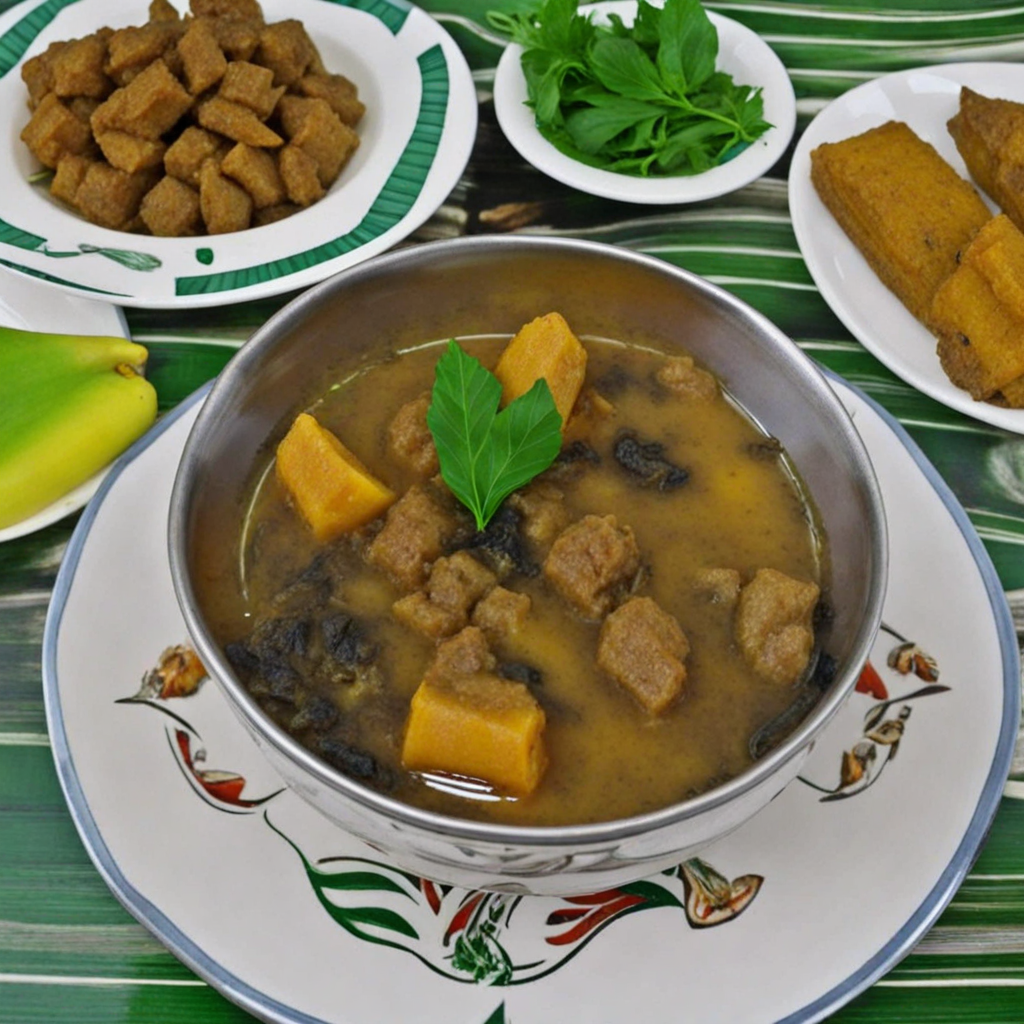Ukodo
Ukodo, also known as yam pepper soup, is a traditional Nigerian dish that tantalizes the taste buds with its unique blend of flavors and textures. This hearty dish typically features chunks of yam boiled to perfection, providing a creamy and starchy base that complements the bold, aromatic broth. The pepper soup itself is a spicy, savory concoction made with a variety of spices, such as uziza seeds and alligator pepper, which infuse the dish with a distinctive heat and depth. Often, the soup is enriched with meat or fish, adding protein and further enhancing its flavor profile.
How It Became This Dish
The Rich Tapestry of Ukodo: A Culinary Journey through Nigeria #### Origins of Ukodo Ukodo, a traditional dish from Nigeria, holds a special place in the hearts and palates of the Yoruba people, primarily found in the southwestern region of the country. The name "Ukodo" translates to "yam pepper soup" in the Yoruba language, and it is a dish that marries the hearty texture of yams with the aromatic complexity of spicy broth, usually prepared with goat meat or fish. The origins of Ukodo are deeply intertwined with the agricultural practices of the Yoruba, who have cultivated yams for centuries. Yams are not only a staple food in the region but also a symbol of wealth and prosperity, often celebrated during the annual Yam Festival, where the first yams of the season are offered to the earth goddess. Historically, the roots of Ukodo can be traced back to the early settlements in Nigeria, where cooking techniques were passed down through generations. Traditional methods of food preparation were characterized by the use of local ingredients and spices, which were often influenced by the availability of resources in the environment. The incorporation of pepper soup—a spicy broth enriched with local herbs and spices—reflects the Yoruba's affinity for bold flavors and their understanding of the medicinal properties of certain ingredients. #### Cultural Significance Ukodo is more than just a dish; it is a culinary emblem of hospitality and community. It is often served at significant gatherings, such as weddings, festivals, and family reunions, symbolizing unity and celebration. The sharing of Ukodo at communal feasts fosters a sense of belonging and strengthens social bonds among participants. In Yoruba culture, food is an essential aspect of social interaction, and Ukodo embodies this ethos by inviting people to gather around the table, share stories, and create lasting memories. Moreover, Ukodo has taken on various meanings in different contexts. It is often associated with the idea of rejuvenation and recovery, frequently served to those who are recovering from illness or fatigue. The warm, spicy broth is believed to have restorative properties, making it a comforting choice for those in need. This aspect of Ukodo highlights the Yoruba's understanding of food as nourishment not just for the body, but also for the spirit. #### The Ingredients of Tradition The preparation of Ukodo involves a blend of traditional ingredients that reflect the richness of Nigerian agriculture. The primary ingredient, yam, is often boiled until tender, while the broth is created using a combination of meat—typically goat or fish—and a medley of spices, including pepper, ginger, and local herbs. The use of spices is particularly important in Nigerian cuisine, as they contribute to the unique flavor profiles that define regional dishes. In the past, the ingredients for Ukodo were sourced primarily from local markets or home gardens, emphasizing the importance of sustainability and local food systems. As globalization has seeped into Nigerian culture, some ingredients have become more accessible, and variations of Ukodo have emerged. For instance, the introduction of new meat types, such as chicken or even vegetarian options, has broadened the appeal of this beloved dish. #### Evolution Over Time Over the decades, Ukodo has evolved while still maintaining its traditional roots. The rise of urbanization and migration has led to a fusion of culinary practices, with many Nigerians adapting traditional recipes to suit modern tastes. As people from different regions of Nigeria and beyond come together, they bring their own culinary influences, resulting in a dynamic reinterpretation of Ukodo. In contemporary settings, Ukodo has found its way onto restaurant menus, both in Nigeria and in diaspora communities around the world. Chefs are experimenting with presentation, incorporating modern plating techniques and garnishes to create visually appealing dishes while still honoring the essence of the traditional recipe. The rise of social media has also contributed to Ukodo's popularity, as food enthusiasts share their experiences, recipes, and variations online, thus creating a global community around this cherished dish. Furthermore, Ukodo has been embraced as a symbol of Nigerian identity on the international stage. As the world becomes increasingly connected, Nigerian cuisine, including Ukodo, is gaining recognition and appreciation. Festivals celebrating Nigerian culture often feature Ukodo, showcasing its significance to both locals and those new to the cuisine. Such exposure has not only elevated Ukodo but has also sparked interest in the rich tapestry of Nigerian culinary heritage. #### Conclusion: A Dish of Unity and Heritage In essence, Ukodo is a vibrant reflection of Nigeria's cultural identity, encapsulating the essence of the Yoruba people. Its origins rooted in agriculture, its cultural significance as a symbol of community, and its evolution through time all contribute to the dish's enduring appeal. As Nigeria continues to navigate the complexities of modernity while preserving its rich traditions, Ukodo stands as a testament to the power of food in bringing people together. As you savor a bowl of Ukodo, you are not just enjoying a meal; you are partaking in a centuries-old tradition that unites generations, transcending geographical boundaries and personal experiences. It embodies the spirit of hospitality, the joy of shared meals, and the celebration of cultural heritage, making it a dish that will continue to thrive in the hearts and homes of many for generations to come.
You may like
Discover local flavors from Nigeria







